Is your planning technique effective?
Do you find yourself always exhausted, racing to meet your deadlines at the last minute? Do you plan your life carefully and keep track of time well, but still struggle to get your job done on time? Don’t be surprised if you are, because you are not the only person in this world who fell into the planning fallacy mindset without realizing it.
The Planning Fallacy was first introduced by Daniel Kahneman and Amos Tversky in 1979. They proposed that human beings are not very good at estimating time, costs and risk to complete certain tasks, even if we have the right experience in doing such tasks. This results from only focusing on a prediction, based on specific elements of a plan, rather than the distributional data. This leads to tasks not being completed on time because the individual underestimates what is needed for the deadline to be met. Furthermore, we can be overly optimistic about ourselves, in that we believe that we have enough time to complete tasks. Consequently, this means that the individual makes excuses for poor time-keeping.
Design thinking is one of the most effective ways in which a person can overcome this struggle in planning and executing what has been planned. Design thinking is a human-centric concept to help people design their own solution by digging into the root causes and solving them. It is time to spend your time tailoring your own plan for the new year.
STAGE 1: EMPATHIZE – WHO ARE YOU?

Understanding yourself is easier said than done, but it is time to take a seat, to have a self-talk, to identify your strengths and weaknesses as well as to clarify your short-term and long-term goals.
There are 4 questions you should ask yourself. Try to answer as honestly and clearly as possible:
- What strengths make you proud of yourself?
- What weaknesses make you lose your opportunities?
- Now, what do you want to change?
- What is your dream for the future?
Do not answer in general like “I want to improve my English level” instead, make it specific and measurable like “I want to achieve IELTS 6.5 in the next 6 months”. The more details you give, the deeper you will understand yourself. Such types of answers will make your plan more practical and more suitable to yourself, therefore making it easier for you to implement the plan.
TIP: Consider asking your parents, your relatives, your co-workers or whoever in this world that you believe understands you, and ask for their opinions. This will help to avoid a subjective understanding about yourself or an illustration of yourself that you created.
The goal for this stage is to dig into who you are, to learn and to explore more about yourself.
STAGE 2: DEFINE – WHAT DID YOU DO?

After learning about yourself, your next step is to reflect on what you did last year by answering the following 3 questions:
- Which goals/tasks did you complete in the last year?
- Which goals/tasks did you plan but fail?
- Which goals/tasks did you reschedule ?
Next steps: List down all of the reasons both subjectively and objectively that you think led to the failure of task completions. This will enable you to find a method that avoids procrastination in implementing the plan in the new year. There are many methods to help solve your procrastination and to reschedule the task completion on time, which may come from internal or external factors. For example, you may feel that if sharing your plan on social media or with close friends will motivate you to achieve your goals. Or you may challenge yourself with punishments and rewards. Whatever you choose to do, just make sure that it will boost your must-do attitude meaning that no delay or procrastination is allowed.
STAGE 3: IDEATION – WHAT ARE YOUR GOALS?

In this stage, you should keep calm and relax, let your mind wander to write down your goals: what do you want to improve or what you want to change? Where do you want to travel? How many books or what kinds of books do you want to read this year? Do not forget to think about your dream. Just write them down in your journal or whatever place you feel safe. Don’t worry if it may look a little bit messy on your paper, I will help you arrange it later.
One important note you should bear in mind is that your techniques should help you to overcome your procrastination, which you have listed in the ‘Stage Two: Define’. Ideation will be the foundation to enable you to implement the method successfully, thus try to make it as precise as possible.
STAGE 4: PROTOTYPE – PUT YOUR GOALS INTO PLAN

Design thinking is the solution-orientated and action-orientated step in which you must focus on finding actionable solutions. Thus this stage is the most important in the planning process. In this stage, you will put all your goals and activities into a detailed plan.
-
Categorize your goals and actions:
The first step is to divide your goals into 3 smaller categories:
- Personal Development: The goals or actions that will help you nurture your personal growth.
- Study/Work: The goals and actions that will lead you to your career path.
- Family/Friends: The goals and actions that will strengthen your relationships.
The more correctly categorized and prioritized these goals are, the easier the next steps will be.
-
Strategic plan
These previous parts will be evaluated again in time length and importance in order to categorize them into short-term, medium-term and long-term goals. This step requires a lot of effort and careful thinking so as to avoid mistakes. The following is one technique that I find easy to apply.

Firstly, start with the axis of abscissas, you put all the goals in this axis. Arrange these goals based on its level of importance and affection to yourself.
After that, you will use the axis of ordinate to evaluate the difficulty level, time and effort in each goal. The more difficult the goal is, the more time you spend, thus you can move this goal to a higher position.
For example, if your goal is to achieve IELTS 6.5 in 2020, to me it is a medium difficulty level and it is also important. Thus my graph will be like this:

As you see the strategic plan graph divides into 3 parts:
Part 1 – Short-term and easy goals that you can finish in 3-6 months
Part 2 – Medium-term and average difficult goals that take longer time about 6-18 months to complete.
Part 3 – Long-term and difficult goals but not urgent goals which you can finish in 2-3 years.

Put your goals into these 3 sections and the goals, which are in the Part 1 area, are prioritized in your detailed plan.
-
A Detailed Plan
The detailed plan includes 2 important numbers: deadline and key result.
- Key results: A plan is nothing without clear and measurable outcomes because they help you estimate the desired results and avoid giving up in the middle.
- Deadline: Give yourself specific time of completion in the goals. There are many apps which can assist you as the reminder like: Evenote, Wunderlist, Calendar,… These apps will help you stick to your goals and complete them on time.
In terms of the medium-term and long-term goals, you can break them into smaller activities and put them into your detailed plan. This action will make sure that you are following what you have planned and start doing it from now.
STAGE 5: TEST – CONTINUOUS PLAN IMPROVEMENT

The plan is just what you write down on paper. That’s why to make this plan come true, you need to invest your time, money and effort. There is no perfect plan in the world and you should test, do, learn and test again, as to which method fits with your style. You might not be able to change your goals but you can change the way you take action in order to achieve your goals. Be flexible and be prepared because there will be uncontrollable factors coming from the external environment, as well as from yourself, that may cause failure in implementing your plan.
I hope that you can stay focused on what you are about to do, always believe in yourself and always try your best to be a better you. Remember that if you plan it on just paper, next year you will be in the same state as you are right now but you’ll be one year older. Be strong and brave, take action, and challenge yourself!
I hope all your plans come true as you expected.



















